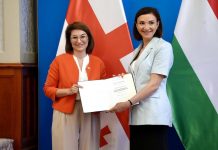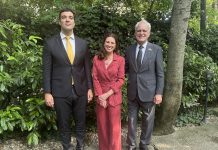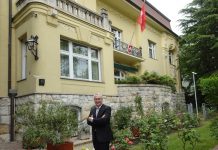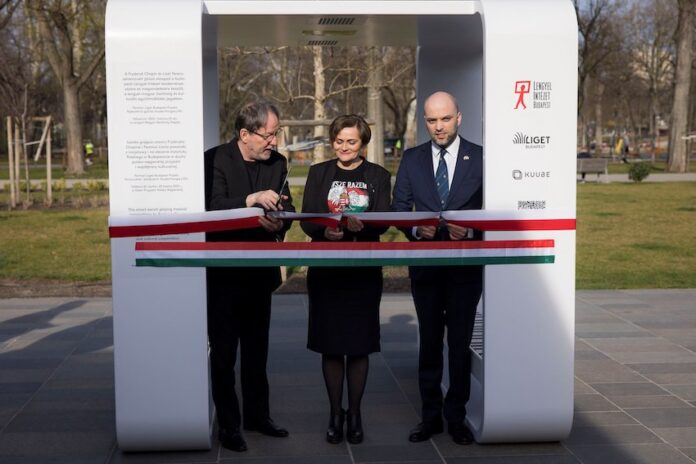Edited by Anna Popper
On the occasion of the Day of Polish-Hungarian Friendship, celebrated annually on 23 March, a smart bench with a music box playing musical pieces from Frédéric Chopin and Franz Liszt, two genius composers of Polish and Hungarian music history, performed by a Hungarian pianist Gábor Farkas, was unveiled in the City Park (Liget) in Budapest. It was the idea and initiative of the Polish Institute to mark by this the long-standing friendship and cultural cooperation between the two countries.



In his opening speech at the inauguration ceremony, H.E. Sebastian Kęciek, Ambassador of the Republic of Poland to Hungary, emphasized that it was a great pleasure for him to present this very special gift on the Hungarian-Polish Friendship Day in 2023. The Ambassador added that in this time of war, the Polish Institute’s activities serve to foster and deepen the relations between the two countries, and cooperation would further strengthen the thousand-year friendship. The Director of the Polish Institute in Budapest, Mrs Joanna Urbanska stressed that the daily work of the Cultural Institute is carried out in the spirit of Polish-Hungarian friendship and cultural cooperation. “Our gift comes from the heart, so I am sure it will be warmly welcomed by its users,” she said.








A gift that comes from the heart…
The eco-friendly smart bench was developed by Gallaidesign and manufactured by KUUBE Hungary Ltd., it features information on touchscreens with a selection of musical works by Chopin and Liszt. This street furniture is solar-powered, can be used to charge mobile phones, acts as a Wi-Fi hotspot and displays the UV index, air pressure, humidity and pollution. Its location was chosen with the intention of being in the heart of the city’s cultural life, close to the greatest museums and Heroes’ Square, one of the most visited tourist attractions of Budapest.





Brief History of Polish-Hungarian Friendship Day
On 12 March 2007, the Hungarian National Assembly unanimously adopted the decision declaring 23 March as the Day of Polish-Hungarian Friendship. On 16 March 2007, the Sejm of the Republic of Poland also adopted a similar decision with the same content.
The origin of the friendship and brotherhood between the two peoples dates back thousand years. The history of close Hungarian-Polish relations started in the Middle Ages, when the royal houses of the two countries were linked by dynastic ties. In the 14th century, under the reign of King Louis I the Great of Anjou, the two countries were part of a personal union between 1370-1384. The younger daughter of King Louis I, Jadwiga (Hedvig) was the first woman to be crowned as monarch of the Kingdom of Poland, she reigned from 1384, being surrounded by love and respect, until 1399, the year of her death. The canonised Saint Jadwiga became the patron saint of Poland. Between 1440-1444, the two countries again shared the same ruler: King Wladyslaw III of Poland became also King of Hungary, the first from the Jagiellon dynasty.
One of the greatest rulers of the Polish nation was Stephen (István) Báthory of Hungarian descent, Prince of Transylvania, Grand Duke of Lithuania, who reigned on the Polish throne between 1575-1586. The Hungarian high noble Ferenc Rákóczi II, Prince of Transylvania, after returning home from Poland, started his long struggle for freedom between 1703-1711. General Józef Bem (1794-1850), the Polish freedom fighter, was an outstanding general during the Hungarian Revolution of 1848-1849, a national hero of Poland and Hungary.
The bond between the two nations became even stronger in the 20th century: in the autumn of 1939, when Hitler’s Germany and Stalin’s Soviet Union launched attacks on Poland, Hungary began to take in and shelter Polish refugees. During WWII about 100-140 thousand Polish refugees stayed in Hungary. In the fall of 1939, approximately 70-90 thousand Polish soldiers and civilians entered the territory of Hungary. In 1940 the majority left, but around 30.000 soldiers and civilians remained in Hungary until the end of the war. The friendship grew even stronger when the Polish nation actively showed solidarity with Hungarians during the Hungarian Revolution of 1956. One of the symbols of cultural relations is the increasing number of Hungarian-Polish twin towns, presently there are about 150 twin towns.
Every year on this day we celebrate the friendship, brotherhood and camaraderie that has grown strong over thousand years between the two Central European nations, who traditionally enjoy very close friendship, brotherhood and multifaceted cooperation at all levels. Sincerely hoping that it will continue to stand the test of time as it has so far by enduring throughout the greatest challenges of history even in the most difficult eras.
The words of the Polish revolutionary, Stanislaw Gabriel Worcell, written in 1849: “Hungary and Poland are two ever-living oaks, which have grown separate trunks, but their roots run far underground, interconnected and invisibly intertwined.”
Long live Polish-Hungarian Friendship!
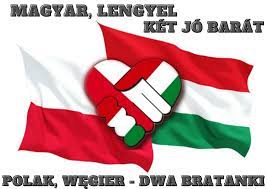
Source: Embassy of the Republic of Poland

